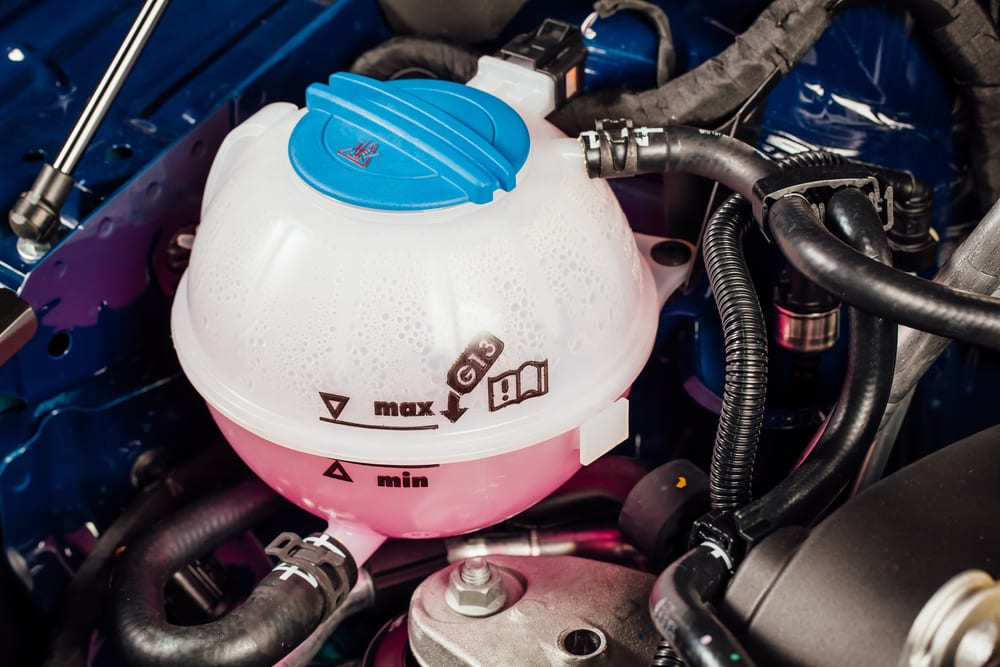

A combustion engine works by burning a mixture of fuel and oxygen at temperatures over 200 degrees. Complete this process more than 2,000 times per minute, and you’ll understand how an engine can develop a lot of heat, and fast. While the exhaust system is designed to expel hot gases from the engine after being burned, the metal still absorbs heat and needs to be cooled. This is where engine coolant or antifreeze works in conjunction with the vehicle's cooling system.
Vehicles have an engine coolant system that circulates engine coolant or antifreeze through the motor to keep it running cool and efficient. While the product itself is intended to help remove heat from the car engine, it only works correctly when the entire coolant system is operating at peak efficiency.
Understanding the Basics of Engine Coolant or Antifreeze
Antifreeze or engine coolant is made from the heat-absorbing ingredients ethylene glycol or propylene glycol to help collect heat from the engine components. In its pure form, it is designed to expand as it increases in temperature. Due to this, engine coolant is mixed at a 50/50 ratio with distilled water and should be replaced or flushed as recommended by your vehicle's manufacturer.
Where “Antifreeze” Comes From: The chemicals used in engine coolant also help prevent the liquid in your engine from freezing during cold temperatures. However, if the mixture of your engine coolant has more water than antifreeze, it will be less effective at reducing the freezing point of a liquid. If the engine coolant freezes inside your motor, it can cause engine components to crack, which could soon result in catastrophic engine damage.
Adding Antifreeze to the Engine: It’s often assumed that the more engine coolant inside your motor, the cooler it will run – or the less likely it is to freeze. However, the chemicals in antifreeze are designed to expand as they heat, and can contribute to potential overheating problems. It’s recommended to blend engine coolant with distilled water at a 50/50 ratio.
Does Engine Coolant/Antifreeze Have Any Other Jobs?
Absolutely! Contrary to popular belief, engine coolant or antifreeze does much more than simply keep the engine running cool. Some of the additional benefits of having fresh engine coolant inside your coolant system include:
- Keeping your engine coolant from freezing during the winter.
- Preventing engine coolant from boiling during the summer and lowering the liquid boiling point.
- Reducing the onset of rust and corrosion from metal parts.
- Keeping rubber and plastic parts from corroding.
- Helping to reduce electrolysis.
What is Antifreeze Electrolysis?
As water or engine coolant circulates through the coolant tubes, it eventually breaks down and loses some natural acidity. When this happens, the coolant can become electrically charged. This is known as electrolysis. While it’s not a significant amount of power, it can cause internal engine components (especially aluminum) to wear out sooner than they should. To prevent this from happening, engine coolant should be flushed as recommended by your manufacturer.
What’s the Difference Between Engine Coolant and Antifreeze
While it’s assumed they are one and the same, they are technically two different substances. The engine coolant is the liquid that circulates through the engine, into the radiator, and back into the engine. The antifreeze is a chemical compound used in engine coolant to reduce heat and the potential of engine coolant freezing.
There are different types of antifreeze or engine coolant.
- Inorganic Acid Technology: Commonly known as ‘green or yellow antifreeze,’ IAT is commonly used and mixed with distilled water, and usually only lasts three years or 36,000 miles.
- Organic Acid Technology: OAT is considered the long-life coolant or ‘orange antifreeze’. While many believe it can last up to 150,000 miles, it should be flushed as often as recommended by your manufacturer.
- Hybrid Organic Acid Technology: The HOAT is a combination of the two above and typically referred to as ‘global’ due to the specification or certification ratings (which start with the letter “G”).
What Engine Coolant Should You Use?
This is the $3,000 question. The typical head gasket replacement or used engine replacement job will cost you more than $3,000. You can avoid overheating, and likely engine replacement, by using the recommended coolant listed in your vehicle owner’s manual. If you don’t have an owner’s manual, you can contact a professional mechanic and request them to complete a coolant flush. When they set up the appointment, they will review the service manual for your vehicle and bring the recommended antifreeze.



